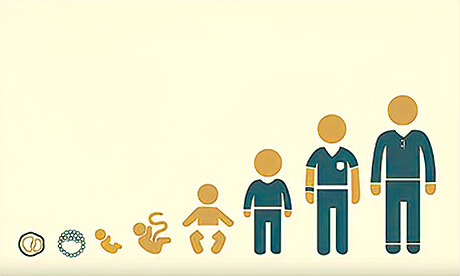When does life begin?
Those four words are regularly posed in the current abortion debate, so let’s scan the lines in pregnancy that have been drawn by experts — religious and secular — in the past.
Pre-scientific cultures spoke of “quickening,” typically between 16 and 18 weeks, when the mother first feels the unborn child moving in her womb.
A famous example involves the unborn John the Baptist in biblical Luke 1:41. Some ancient Jewish authorities in the Talmud, and Roman and Greek philosophers, supposed that the unborn child “formed” earlier, at 40 days.
Then there’s “viability,” when a fetus can live on its own outside the womb, typically reached around 23 or 24 weeks, or somewhat earlier or later in individual cases.
The U.S. Supreme Court legalized abortion before that point in its 1973 Roe v. Wade decision, and after viability when there are risks to the mother’s health, broadly defined.
The High Court on December 1 hears a case from Mississippi, which defied the Roe ruling and bars abortions after 15 weeks on grounds that the fetus experiences pain by then.
A Missouri law, also under court challenge, puts a ban at eight weeks when “everything that is present in an adult human is now present in your baby,” according to the American Pregnancy Association.
The Court temporarily left in place a ban in Texas (likewise in 13 other states) after six weeks, when pulsations can be diagnosed at what eventually becomes the fully formed heart.
Many modern Christians believe that life begins at conception (sperm first meets egg) or implantation (fertilized egg attaches to the mother’s womb) while some put the line a bit later at twinning (after which multiple pregnancies do not occur).
Note the brief filed last month in the Mississippi case by pro-choice religions including “mainline” Protestant churches, non-Orthodox Judaism, Unitarian Universalists and others.
It says “numerous religious traditions posit that life begins at some point during pregnancy or even after a child is born.”
That perhaps refers to the judgment of some Jewish authorities that the baby only becomes a “person” at birth, though that’s different from when “life” begins.
Pro-choice Supreme Court briefs contend that when “life begins” is a question of religious “belief” and therefore not the business of government to determine.
When human life begins is not a matter of faith; it is a matter of scientific fact
That assertion is contested by conservatives such as Catholic author George Weigel, writing for First Things magazine.
“When human life begins is not a matter of faith; it is a matter of scientific fact,” he writes.
People believe in the conception line just like they “believe” that “the Earth is spherical, not flat; that Venus is the second planet in the solar system; that a water molecule is composed of two hydrogen atoms and one oxygen atom. …”
Christians like Weigel have a point if biological science determines the question.
It’s incontestable that at conception, or right afterwards, at implantation or twinning, a genetically unique entity in the human species exists that will automatically generate continual growth on its own unless abortion or natural miscarriage intervenes.
If so, then the question is not really “when does life begin,” which is firmly established by science.
Rather, the issue religions, judges, politicians and citizens face is when protectable life begins.
Does this tiny living organism have any inherent value and right to exist, balanced against the right of the mother to abort?
Why or why not, at what stage of pregnancy, under what circumstances, and who decides?
That takes us beyond biology to moral decision-making.
On that, the Catholic Church teaches that direct abortion is illicit even if performed to save the mother’s life.
This is defined in the 1974 “Declaration on Procured Abortion” from the Vatican doctrinal office, ratified by Pope Paul VI. Even “a serious question of health, sometimes of life or death, for the mother” can never “confer the right to dispose of another’s life, even when that life is only beginning.” Pope John Paul II affirmed this in his 1995 encyclical letter Evangelium Vitae (“The Gospel of Life”).
The U.S. bishops’ 2001 medical directive notes that the church does not forbid treatments to cure “proportionately serious pathological conditions of a pregnant woman” that cannot be postponed till birth, “even if they will result in the death of the unborn child” as a secondary effect.
Among Protestants, however, even conservatives and evangelicals allow abortion to save the mother’s life. So do all branches of Judaism.
- Richard Ostling is a former religion reporter for the Associated Press and former correspondent for TIME Magazine.
- Republished with permission from Religion Unplugged
